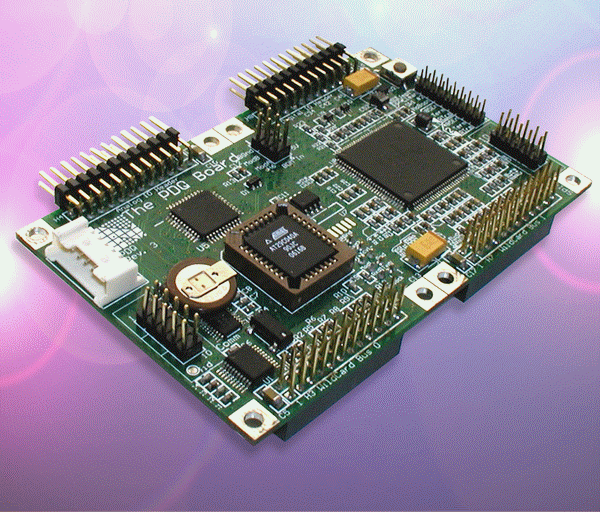PDQ Board
An Advanced HCS12 Microcontroller Development Board and Instrument Controller
for Embedded and Real-Time Systems

The PDQ Board is a single board computer (SBC) that dramatically cuts the cost of data acquisition and control. It packs a Freescale 9S12 microcontroller, 1 megabyte of memory, communications, dozens of analog and digital I/O lines, and dual expansion I/O buses onto a compact low-cost board. This fast low power microcontroller measuring just 2.5" x 4" is an elegant alternative to pc104 and is ideal for instrumentation, industrial control, automation, and data acquisition.
The PDQ Board with the Mosaic IDE Plus (GNUC compiler and integrated development environment) provides a high performance, enhanced memory alternative to development using Freescale's CodeWarrior on conventional, limited memory development boards.
This SBC/industrial controller hosts a fast Freescale MC9S12A512 microcontroller (an upgrade of Motorola's 68HCS12, now also called a 9S12 or HCS12) – a combination microprocessor and fast, deterministic digital and analog I/O. The microprocessor sports a 16-bit data bus and uses a Phase Locked Loop to synthesize a 40MHz internal clock and 20MHz bus clock, resulting in execution speeds 8 times faster than the 8-bit 68HC11 processor. The processor's native address space is only 64K, so a paging architecture is used to expand the addressable memory to 1 MByte. The address space is populated by 512K internal Flash, 14K internal RAM, 1K processor registers, 1K internal EEPROM, plus 496K of fast off-chip RAM. The off-chip RAM comprises 16K of common unpaged RAM that is available for data storage regardless of the page, and 480 Kbytes of paged RAM. The paged RAM is shadowed by external Flash that acts like an onboard disk drive, restoring your program code from Flash memory each time the board is powered up. This flexible memory architecture allows for both RAM- and Flash-intensive applications, and makes program development a snap.
Plenty of digital, time-controlled, and analog I/O
The PDQ Board packs dozens of analog and digital I/O lines plus versatile serial communications links onto a compact board. It delivers 8 digital I/O lines with counter/timer capabilities, 8 pulse-width modulated (PWM) digital output signals, and 8 general purpose digital I/O lines. Additional I/O includes sixteen analog inputs with 10-bit resolution, dual RS232/485 ports with speeds to 256 KBaud, and synchronous SPI and IIC serial interfaces. Any of the digital I/O ports can be configured for general purpose I/O, and the analog input lines can be configured as digital inputs. An optional battery-backed real-time clock reports the time and date.
Programmable in C or Forth using the Mosaic IDE Plus
You program your PDQ Board using a full featured Integrated Development Environment, the Mosaic IDE Plus. This software suite runs on any PC and provides project management tools, a source code editor, a customized GNU C compiler, and assembler. You can program in the standard C language, or in Forth, an embedded language designed for rapid development.
Built-in programming tools include a multitasking executive and comprehensive device-driver libraries. All functions can be called interactively from the terminal to speed the debugging process. In addition, the processor implements a Background Debug Mode (BDM) in hardware that facilitates real-time debugging. An available attachment to your desktop PC connects to the BDM port on the board, enabling you to set breakpoints, single step, and trace to diagnose your program at runtime.
An Application Programming Interface (API) for the 9S12 processor
The Mosaic IDE Plus provides a full application programming interface (API) to the PDQ Board's processor. The 9S12 processor is a sophisticated microcontroller containing numerous I/O subsystems for timed digital I/O, analog I/O and communications, each with suites of internal registers to control their behavior. To simplify the use of the processor's I/O, the Mosaic IDE Plus provides precoded drivers for all of the 9S12 I/O subsystems. Using these built-in drivers you do not need to directly access the processor's control registers, but instead you can call high level drivers that implement simple and sensible functions.
The PDQ Board Users Guide provides you with a good introduction to hardware and software interfacing. Each chapter focuses on one of the processor's I/O subsystems, and describes the device drivers available to fully use it.
The PDQ Board Users Guide is a total solution for learning and teaching real-time and embedded system design based on the Freescale HCS12/9S12 microcontroller. These guides will show you step-by-step how to program the HCS12 using both assembly and C languages using the GNU C based Mosaic IDE Plus. Pre-coded driver functions and supportive examples clearly illustrate all applications of the HCS12 peripheral functions, including its parallel port, timer functions, PWM output lines, timer capture lines, UART port, SPI, I2C, on-chip Flash and EEPROM, and paged external memory expansion.
Looking to Order?
- You can find price and delivery information on Mosaic's website, or contact us directly.
- You may also want to expand your I/O capabilities with some Compatible Accessories.
If you don't find an answer in the documents here, feel free to contact us for help with your application.
If you have just purchased the PDQ Board
For guidance on using this controller, take a look at the following documents:
See also → Single Board Computers
